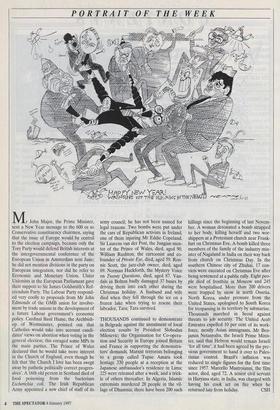PORTRAIT OF THE WEEK
Mr John Major, the Prime Minister, sent a New Year message to the 600 or so Conservative constituency chairmen, saying that the issue of Europe would be central to the election campaign, because only the Tory Party would defend British interests at the intergovernmental conference of the European Union in Amsterdam next June; he did not mention divisions in the party on European integration, nor did he refer to Economic and Monetary Union. Ulster Unionists in the European Parliament gave their support to Sir James Goldsmith's Ref- erendum Party. The Labour Party respond- ed very coolly to proposals from Mr John Edmonds of the GMB union for involve- ment by trade unions in the development of a future Labour government's economic policy. Cardinal Basil Hume, the Archbish- op of Westminster, pointed out that Catholics would take into account candi- dates' views on abortion when voting in the general election; this enraged some MPs in the main parties. The Prince of Wales declared that he would take more interest in the Church of England, even though he felt that 'the Church I love has been swept away by pathetic politically correct progres- sives'. A 16th old person in Scotland died of food poisoning from the bacterium Escherichia coli. The Irish Republican Army appointed a new chief of staff of its army council; he has not been named for legal reasons. Two bombs were put under the cars of Republican activists in Ireland, one of them injuring Mr Eddie Copeland. Sir Laurens van der Post, the Jungian men- tor of the Prince of Wales, died, aged 90. William Rushton, the cartoonist and co- founder of Private Eye, died, aged 59. Ron- nie Scott, the jazz-club owner, died, aged 69. Norman Hackforth, the Mystery Voice on Twenty Questions, died, aged 87. Van- dals in Bolton badly damaged 37 buses by driving them into each other during the Christmas holiday. A husband and wife died when they fell through the ice on a frozen lake when trying to rescue their labrador, Tara; Tara survived.
THOUSANDS continued to demonstrate in Belgrade against the annulment of local election results by President Slobodan Milosevic; the Organisation for Co-opera- tion and Security in Europe joined Britain and France in supporting the demonstra- tors' demands. Marxist terrorists belonging to a group called Tupac Amaru took hostage 330 people at a reception at the Japanese ambassador's residence in Lima; 225 were released after a week, and a trick- le of others thereafter. In Algeria, Islamic extremists murdered 28 people in the vil- lage of Dhamnia; there have been 200 such killings since the beginning of last Novem- ber. A woman detonated a bomb strapped to her body, killing herself and two wor- shippers at a Protestant church near Frank- furt on Christmas Eve. A bomb killed three members of the family of the industry min- ister of Nagaland in India on their way back from church on Christmas Day. In the southern Chinese city of Zhuhai, 17 con- victs were executed on Christmas Eve after being sentenced at a public rally. Eight peo- ple died of frostbite in Moscow and 245 were hospitalised. More than 200 drivers were trapped by snow in north Ossetia. North Korea, under pressure from the United States, apologised to South Korea for trespassing in its territory by submarine. Thousands marched in Seoul against threats to job security. The United Arab Emirates expelled 10 per cent of its work- force, mostly Asian immigrants. Mr Ben- jamin Netanyahu, the Israeli Prime Minis- ter, said that Hebron would remain Israeli `for all time'; it had been agreed by the pre- vious government to hand it over to Pales- tinian control. Brazil's inflation was reduced to single figures for the first time since 1957. Marcello Mastroianni, the film actor, died, aged 72. A senior civil servant in Haryana state, in India, was charged with having his cook set on fire when he returned late from holiday. CSH


























































 Previous page
Previous page